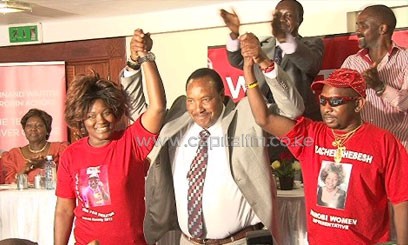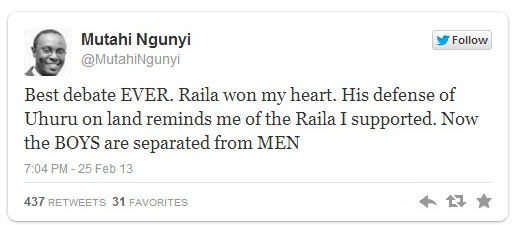“Quiet! I need silence, you guys are just chit-chatting. The
puppeteers need to hear playback,” says the floor manager in a
remarkably cool tone considering the ruckus around him.
For a moment, the assortment of cameramen, designers, puppeteers,
light and sound technicians heed the warning – before picking up their
"chit-chat" once again.
The playback – or audio track – starts up again. “This is The XYZ
Special,” intones a voice on the speakers. “We are live at the election
centre…”
This is the set of “The XYZ Show”, Kenya’s first-ever satirical
puppet TV programme, which lampoons the country’s politicians and
fearlessly tackles some of the country’s thorniest issues with
side-splitting aplomb.
Days before Kenya’s landmark March 4 polls, the team is recording its
election special at a studio in The GoDown Arts Centre in downtown
Nairobi. This episode will air on Sunday, the eve of the elections, and
there’s a palpable sense of purpose underlining the buzz in the room.
“This is a very critical moment for the show,” says Godfrey Mwampembwa, the programme’s creator and producer.
Mwampembwa – better known as “Gado” across Kenya – pauses briefly as
he considers the occasion. “This is what we’ve worked for all these
years. This is such an important election. This is such an important
year for Kenya. As much as we have pushed for this freedom of
expression, a lot more still needs to be done.”
Imprisoned presidents and dissected brains
A veteran newspaper cartoonist, Gado began his career more than two
decades ago, when Daniel Arap Moi – a dictator accused of brutally
crushing the opposition – held power.
Since then, Kenya has taken giant strides in freedom of expression,
with the US-based Freedom House listing Kenya as “partly free”.
These days, “The XYZ Show” can get away with featuring a dissection
of Moi’s insect-ridden brain in an attempt to understand Kenya’s endemic
corruption.
In the old days, when he was finance minister, Uhuru Kenyatta – the
son of Kenya’s founding father – earned notoriety for his defamation
suits against local newspapers.
But these days, Kenyatta – who is a 2013 presidential candidate – is
fair game for the show. Two years ago, “The XYZ Show” featured an
episode with Kenyatta and outgoing President Mwai Kibaki behind bars at
The Hague.
 SPOTLIGHT
|
|
|
|
Kenyatta
faces charges of crimes against humanity at The Hague for his alleged
role in orchestrating the bloodshed after 2007 elections, which killed
more than 1,000 people and displaced more than 600,000 others.
If elected, he could be the first sitting head of state to commute
back and forth from The Hague – a prospect of rich satirical
possibilities for “The XYZ Show”.
Nairobi via Paris to Kenyan TV
Gado has long known that Kenya had room for a satirical puppet TV show, but it took years to convince others to make it happen.
More than a decade ago, the 44-year-old political cartoonist was
struggling to get such a programme on air. In 2003, on a visit to
France, he asked his host, the Alliance Française, to set up a visit to
Canal Plus, the TV station that broadcasts the satirical puppet show,
“Les Guignols de l’info”.
“That visit was discouraging because their operation was so huge and
we had nothing,” explains Gado. “But on the other hand, it was also very
encouraging because it was like, man, this is great; we must do it.”
Years of hustling passed, including a clumsy attempt to make a puppet
in Kenya before Gado managed to send a local sculptor to France for a
month-long training session in puppet-making. That trip resulted in a
pilot clip that Gado tried to sell to Kenyan TV stations.
But that proved to be the biggest challenge of them all, with local
broadcasters refusing to sign on or cough up funds for the project.
In mid-2007, Gado happened to mention his pet project to a French
journalist during an interview. “When I saw the pilot, I got it at once,
having grown up with the French programme, “Les Guignols de l’info”.
That was before the [December] 2007 elections,” said Marie Lora-Mungai,
now the executive producer of “The XYZ Show”.
Months
later, the disastrous elections and bloody aftermath unfolded to
Lora-Mungai’s dismay. “I was surprised that such a show hadn’t made it
to the broadcasters,” she explained.
When Gado and Lora-Mungai met again in early 2008, she decided to
sign onto the project and put together a strategy change that relied on
funding from international donors instead of from local TV stations.
After a year of fundraising, the first episode finally aired on Kenya’s Citizen TV in May 2009 – to scathing reviews.
“Things were not working well when we started. The animation was not
good, the writing was very bad,” laughs Gado, displaying some of the
sharp judgment that has helped whip the show to its current standards.
Finally, a concentrated silence
Nearly four years later, “The XYZ Show” has polished its act and is ready to tackle its first elections.
The excitement on the set is now palpable. With the sound rehearsals
over, the cameras are ready to roll and the once-raucous room is now
silent and concentrated.
“…and action!” says the director.
“This is The XYZ Special,” says a latex TV anchor called “Keff
Joinange” - a doppelgänger for seasoned Kenyan journalist, Jeff
Koinange. “We are live at the election centre…”





























